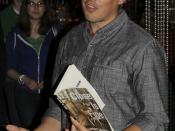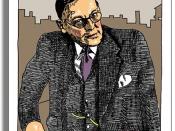People often have trouble clearly stating their obscure emotions and ideas; therefore they associate and realize these ideas through other literature, cinematography, or music. In his dream-like "The Hollow Men" T. S. Eliot uses allusion as a vehicle for his purpose. The purpose seems elusive to the author himself. Therefore, he employs a reference to classic literature to show his reader a glimpse of what he really means through a more explicit analysis the human soul. This purpose is to survey the human as a product of the society and compare fundamental questions about human aspirations and the nature of the civilized society. Both Eliot's poem, and Joseph Conrad's Heart of Darkness have particular tendencies in imagery and organization that portray a common theme of a rift between the belief of a society-influenced man, and the practice of a man at the level of his primal emotions. By selecting Heart of Darkness as a universal allusion in this poem, T. S. Eliot is able to promote his purpose though the themes and rhetoric of this novel.
Conrad's novel is an inward journey to discover what Freud would call the id. This is a level of subconcienceness completely uninfluenced by the world around the individual. T. S. Eliot is trying to express the war-generated emotions and yearnings of his id through imagery, diction, and organization.
T. S. Eliot hides beneath the cover of a larger work, which in its size can more clearly explore this purpose. "Mistah Kurtz - he dead" is the opening line of the poem. Eliot picks up where Joseph Conrad left off in his Heart of Darkness. Conrad looks into the idea of a man in his primal state (Kurtz) versus a man influenced by the society (the hypocritically clean central station manager, for example) in...


